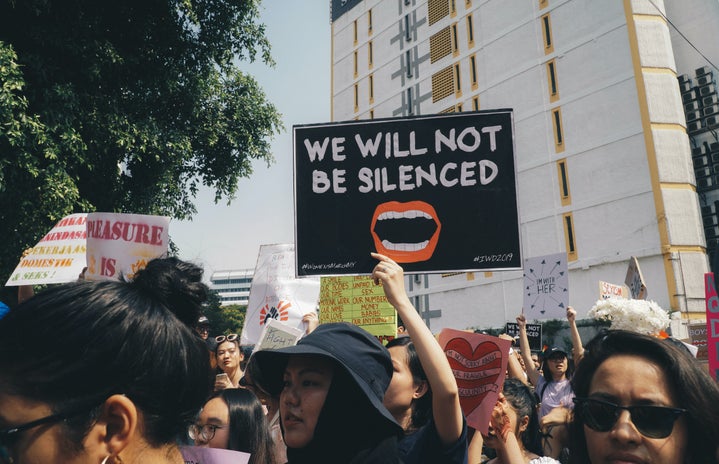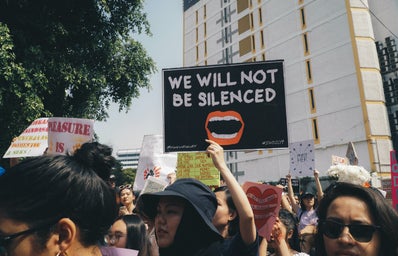In 2023, we have become desensitised to acts of violence, especially those perpetrated against women. Our mothers tell us not to walk down alleys at night, to keep a rape alarm on our keys, and even make us learn basic self-defence, so as not to end up the subject of a news article a few days later. Our language around acts of rape and murder is similar to those of accidents, but rapes and murders are not some mysterious dark forces which occur spontaneously in the middle of the night. They have perpetrators, who are motivated by feelings of entitlement, hatred, and power over women; such attitudes show the increasingly misogynistic culture we live in today.
There is no denying that in recent years, particularly since the murder of Sarah Everard, we have seen greater condemnation of the assailants. The media continues to use labels such as ‘lone-wolf’, characterising the murderers as strange outliers, who had mental health problems and were misunderstood by those around them. This simply perpetuates the problem; by refusing to attach the necessary level of seriousness and shift the narrative away from women being victims, to recognise men being the perpetrators, we tolerate their actions and leave the problem unaddressed.
But this submission cannot go on any longer, especially now with a new, unprecedented form of misogyny, characterised by rising ‘incel’ culture, and the emergence of figures such as Andrew Tate. The British-American influencer first rose to fame following his appearance in ‘Big Brother’ in 2016, from which he was removed due to an alleged assault. However, his presence became increasingly recognised in 2022, not due to his criminal activities, but due to his confession of being an overt misogynist. Tate’s derogatory and possessive language towards women, stating a sexually active woman is merely a ‘second hand good,’ is only representative of a larger societal trend.
Incels can be defined as ‘involuntary celibates,’ who feel they are being categorically denied sexual or romantic gratification from women. What started as an online, fringe misogynistic community, a collation of chat forums and underground networks, has slowly emerged into a more mainstream movement. Its many appendages of varying extremity share the fundamental idea that women’s rejection of men is not only unjust and unfair, but it is also intrinsically wrong and undeserved. ‘Involuntary celibates’ have the foundational belief that attractiveness is genetically determined, and those lacking features predominantly desired by women, are therefore doomed for a life of loneliness and sexual frustration. The language of incels is increasingly possessive, angered at women’s increased economic and social independence, and view this as the direct reason for their growing isolation. They are bound together by this resentment and hatred, communicating through a foreign language of codewords and acronyms to express their anger of being ‘denied’ sex, and in doing so, stripping women of all agency (Bates, 2020).
Incel networks, or the ‘manosphere’, are undeniably supremacist and extremist, clearly showing the in/out-group dynamics of an extremist group, vilifying women, and all men they deem capable of attracting them. What is notable, and most worrying, about the incel movement, is the way in which they characterise women as single-faced and one-dimensional. Women are viewed as only having overt sexual desires, simultaneously being criticised for the exercise of these desires, but also their withholding of them. There appears to be no recognition, nor acknowledgement, that women too are people, capable of the same thoughts, actions, and outcomes as any man.
This may not elicit a sense of urgency, these radical ideas are in the minority after all, and to argue all men view women in this way would simply be a gross exaggeration. However, the ideology of incels and online men’s rights activists have increasingly been diffusing into the mainstream, notable from the number of women online who observed changes in their boyfriends’ behaviour following the peak of Andrew Tate’s fame last summer. We have all unconsciously assimilated incel myths, the most common of which being the alleged disadvantage fathers face in custodial hearings; fact-checking has shown that over half of the time, fathers do not ask for custody, and when they do, the father actually has an overwhelming chance of gaining custody, especially in situations where mothers have attempted to keep the child away from the father. Incel ideologies are creeping into our party politics too, the most notable example being Boris Johnson’s connection with Steve Bannon, Trump’s political adviser, and a figure with notorious links to anti-feminist movements (Bates, 2020).
It cannot be argued that incel ideology does not have real-world impacts, in fact, it is increasingly seen as a motivating factor in terrorist acts today. The first notable instance of a misogynistic terror attack was seen in 2014, when 22-year-old Elliot Rodger killed six people near the University of California, Santa Barbara campus, after publishing an incel ‘manifesto’ which detailed his anger at romantic rejection. His act motivated several others, some very close to home, such as the mass shooting committed by Plymouth resident Jake Davison in 2021. Whilst Devon and Cornwall Police identified no motive prior to the shooting, Davison regularly uploaded YouTube videos discussing his own romantic failures and expressing deeply misogynistic views.
It is important to remember that misogyny does not just exist in the form of domestic terrorism, violence, or murder, it is present in our institutions, our language and socialisation; if we continue to condemn sexism only in its most outright and outrageous forms, we facilitate its build-up into a growing form of extremism. Not every misogynist is a ‘Jake Davison’ or an incel who is active in online forums. They can be your friend, your father, or your boyfriend, who makes sexist, derogatory comments in the form of a ‘joke.’ So, whilst it is important to stay vigilant, and criticise incels and other misogynistic extremists, we must also tackle it from the inside-out, the misogynistic culture we have allowed to develop through our leniency and passivity.


